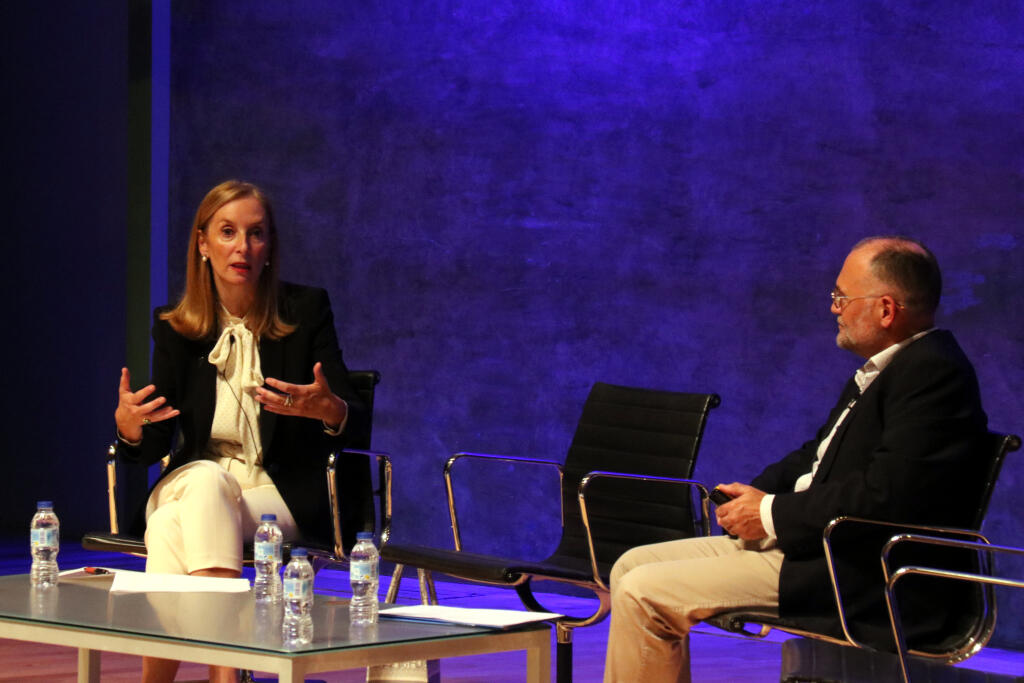20.09.2021 - 08:58
|
Actualització: 20.09.2021 - 10:58
When Anna N. Schlegel (née Anna Navarro Descals) first arrived in Silicon Valley in 1992, she was a philologist from Olot, a town in northern Catalonia, with little experience in the tech industry. She founded a translation start-up, sold it, and went on to work for some of the biggest companies in the United States, such as Cisco, Xerox, VMware or Verisign.
Last year, one of the leading magazines in the AI sector, Analytics Insight, named her one of the most influential women in tech for her work as the vice president of NetApp, a leading cloud company which she recently left to become VP for Procore Technologies. She was also recognized for championing women through her work and the non-profits she founded—but Schlegel is far from satisfied with the progress made towards addressing gender inequality.
In an interview with Catalan News, Schlegel talks about how she deals with frequently being the only woman in the room, what needs to be done to address inequalities, and where Barcelona and its technology sector currently stand at the global stage.
– You moved to the US aged 23 and started working for tech firms. Have things improved for women since then?
– I don’t think the situation has changed that much because when you look at statistics for women in the workplace, it is pretty much what it was 25 or 30 years ago when I started. So the number of women inside a company has not changed that much—it’s the data. If you work in high tech, if you work at data centers or global infrastructure the numbers are very low. People who are developing technology are mainly male. There are lots of women doing marketing, doing human resources, lots of lawyers, lots of women in the press, communications. There’s a lot of women in products, but women that are developing technology, artificial intelligence, are very small in number.
– How do you address gender disparity in the workforce?
– You have to expose younger girls from the very beginning, not to everything that is pink or that has a clip here, or not everything with a doll. You can expose girls to animals and bicycles, explain to a girl how to fix the dishwasher. That girls can do anything that boys can do. You don’t have to separate chores in the home, with the boys taking the trash out and fixing the TV. Girls can fix the TV too. As a parent or a mentor, you have to spend a lot of time bringing girls along.
– How do you deal with being the only woman in the room?
– You have to be very strong inside, very strong. You almost don’t care. When I go into a room and there’s mainly men, I have to not care. I have to be as intelligent as they are, as well-spoken as they are, and I don’t mind anymore. I have to be better. I will prepare better. I am better prepared.
– What should companies do to address gender inequalities at the workplace?
– Revise salaries, because the pay gap is very serious, and also give more paternity and maternity leaves. Any time women present a complaint it needs to be taken very seriously: you want women to have a nice environment, you’re going there to work, very hard, so you don’t need extra drama. You also need to be able to leave at a decent time, so that you can go if you have a family—or don’t have a family, but so that you can be healthy mentally.
– As the host city of the Mobile World Congress and several tech companies, Barcelona is often regarded as a technology hub. How do you see it?
– I think it’s getting better and better. Barcelona is becoming super well known but it’s not quite there yet. Amsterdam sometimes still beats Barcelona, Dublin beats Barcelona, but with Dublin it’s because of the taxes. I think once taxes are more equal across Europe, that may be a tipping point for Barcelona. Now it’s always in the Top 5 of everything, you’re top 1 in software, you’re top 4 in retention… So you’re obviously playing, you’re playing ball. I mean, it’s happening. So we need more of that: to attract more companies, to attract more Microsofts.
– What should institutions do to attract more companies?
– Public agencies like Acció, the Catalan government, the city of Barcelona… everybody needs to be helping, everybody needs to be on the same page. One thing that I’ve realized here, we tend to divide a lot of the effort. Nope! You have to be together, attracting and helping, it doesn’t matter what the name of your institution is. You have to put a plan together for the company to come over, show them offices, show them what the salaries are, and make it very easy for them to come.


